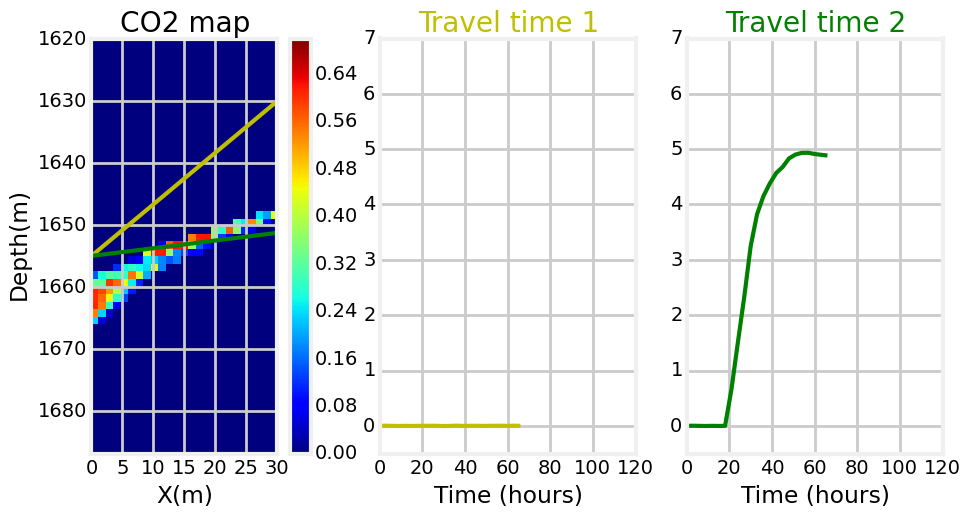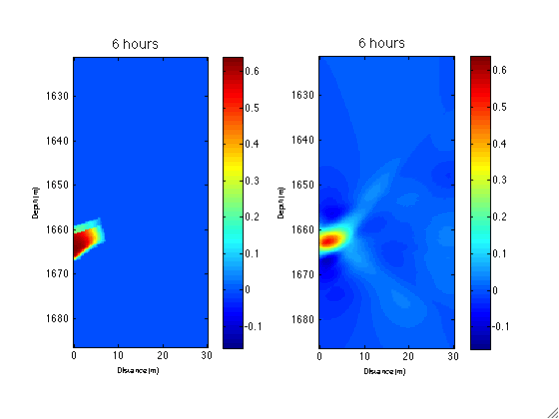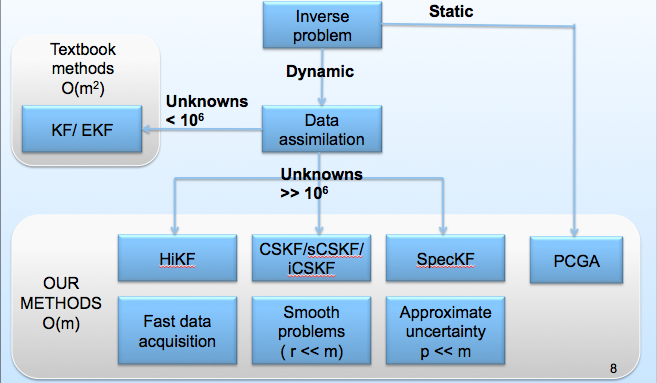============
This is a Matlab library of data assimilation methods developed to solve large-scale state-parameter estimation problems. Data assimilation approach has been widely used in geophysics, hydrology and numerical weather forecast to improve the forecast from a numerical model based on data sets collected in real time. Conventional approach like Kalman filter is computatioanlly prohibitive for large problems. The DASoftware library takes advantage of advances in computatioanl science and consists of new data assimilation approach that is scalable for large-scale problems. The functions and examples are produced based on collabrated work on data assimialtion documented in the papers listed in the Reference section.
This is an ongoing project. The library is incomplete.
- Data assimilation tools for Large-scale real-time estimation problems
- Computationally efficient methods with linear complexity(O(m)) that runs fast even on laptops
- Hands-on examples to learn Kalman filters without the knowledge of the technical details
| Example | Dimension | Linearity | Specific |
|---|---|---|---|
| Saetrom | 1D | Linear | F(x,t) |
| Target tracking | 1D | Nonlinear | F(x),H(x) |
| Frio | 2D | Linear | F = I, fixed H |
Here we show a diagram of the methods provided in the library.
| Method | Assumptions | Jacobian matrix | Covariance matrix |
|---|---|---|---|
| KF | only for small problem | mn forward run | m^2 operations |
| HiKF | fast data acquisition/fixed H | no forward run | O(m) operations |
| random-walk forward model | |||
| CSKF | smooth problem | r forward run | O(m) operations |
| SpecKF | approximate uncertainty/fixed H | p forward run | O(m) operations |
| EnKF | monte carlo based approach | r forward run | O(m) operations |
To get you up and running DASoftware
This Quick Start Guide assumes that you have the following already installed:
- mexBBFMM2D: see the Quick Start Guide for mexBBFMM2D for installing MEX and other dependent libraries. This library is required to run Frio example.
- git: a version control tool
- Download the package by entering the following code in your command line
git clone https://github.com/judithyueli/DASoftware.git
- Obtain data from here and put it in the directory
/DASoftware/data
We have provided the users linear and nonlinear state estimation problems to get familier with data assimilation methods provided in the library. All the built-in examples can be operated using a simple one-line code with an input file (*.txt) including all the assimilation parameters. To run an example, go to the main folder /DASoftware containing main.m and type the following code in MATLAB
[est,true,est_array,true_array] = main(example_txt_file_name);
Input:
example_txt_file_name is the name of the input text file under the folder \example containing the following field
method: name of the Kalman filter method, e.g.,KF,CSKF,HiKFmodel: name of the built in example, e.g.,Saetrom,TargetTracking,Friom: number of unknown state variablesn: number of observed variablesnt: total assimialtion time stepsx_std: initial state standard deviationcov_type: state covariance type, e.g.,exponential,Gaussian, state covariance is specified through a covariance function with two hyperparameters, i.e., power given bycov_powerand length scale given bycov_lenBasisType: a field required for methodCSKFspecifying the dimension reduction type, e.g., the randomized SVD approachrSVDmexBBFMM: optional for theFrioexample. IfmexBBFMM = 1a fast linear algebraic package is used to accelerate the Kalman filter. Default is0
Output:
est: an object containing the Kalman filter estimate at the final assimilation step. Visit the class definition for more information.
est.x: a structure containing the value of the estimated state as a vectorest.P: the covariance matrix at the final assimilation step
true: an object containing the properties of the true state at the final assimilation step. Visit the class definition for more information.
true.xt: a structure containing the value of the true state as a vectortrue.zt: a structure containing the true observation as a vector
est_array: a cell array of structures containing the estimated state given by Kalman filter at each assimilation step
true_array: a cell array of structures containing the true state at each assimilation step
- Run a 1-D linear state estimation example (Sætrom & Omre 2011) with Kalman filter
[est,true,est_array,true_array]=main('examples/prm-saetrom-KF.txt');
- Example of user specified input in
prm-saetrom-KF.txt
method KF
model Saetrom
m 100
n 13
nt 10
x_std 20
obsstd 1
cov_type exponential
cov_power 1
cov_len 6
seed 10
- Figure shows the mean and 95% confidence interval at intial and final time step.
- Run the same problem using CSKF (Li et al. 2015) with N = 20 basis
[est,true,est_array,true_array]=main('examples/prm-saetrom-CSKF.txt');
- Example of user specified input in
prm-saetrom-CSKF.txt
method CSKF
model Saetrom
N 20
BasisType rSVD
m 100
n 13
nt 10
x_std 20
obsstd 1
cov_type exponential
cov_power 1
cov_len 6
seed 10
Consider tracking an aircraft with an unknown constant maneuvering rate using a radar sensor (angle and bearing) yields a model with nonlinear dynamical and measurement equation. The unknown is the location, velocity and the turing rate.
[est,true,est_array,true_array]=main('examples/prm-target-KF.txt');
- Example of user specified input in
prm-target-KF.txt
model TargetTracking
rate 3
dt 1
method KF
nt 100
seed 200
theta_Q 0.6
theta_R 0.3
A description of this example can be found in Daley et al., 2011 and Li et al., 2014. Figure below shows how traveltime time-series signals recorded by sensors at different location can be used to constrain the position of a moving CO2 plume. With the computational efficiency provided by methods like HiKF, these sensor data can be processed in real-time to monitor potential CO2 leakage.

[est,true,est_array,true_array]=main('examples/prm-Frio-HiKF.txt');
- Example of user specified input for a low resolution case containing 3245 unknowns.
method HiKF
model Frio
resolution low
nt 40
theta_Q 1.14e-7
theta_R 1e-5
cov_type exponential
cov_power 0.5
cov_len 900
seed 100
mexBBFMM 0
mexfile_name expfun
- To run a higher resolution case containing 12753 unknowns, run the following code, this may take a few minutes to compile
[est,true,est_array,true_array]=main('examples/prm-Frio-HiKF-M.txt');
- Details of the
prm-Frio-HiKF.txt. Note thatmexBBFMM = 1in order to call the mexBBFMM2D package.
method HiKF
model Frio
resolution medium
nt 40
theta_Q 1.14e-7
theta_R 1e-5
cov_type exponential
cov_power 0.5
cov_len 900
seed 100
mexBBFMM 1
mexfile_name expfun
-
Judith Yue Li, Sivaram Ambikasaran, Eric F. Darve, Peter K. Kitanidis, A Kalman filter powered by H2-matrices for quasi-continuous data assimilation problems link
-
Sivaram Ambikasaran, Judith Yue Li, Peter K. Kitanidis, Eric Darve, Large-scale stochastic linear inversion using hierarchical matrices, Computational Geosciences, December 2013, Volume 17, Issue 6, pp 913-927 link
-
Ghorbanidehno, H., A. Kokkinaki, J. Y. Li, E. Darve, and P. K. Kitanidis, 2014. Real time data assimilation for large-scale systems with the Spectral Kalman Filter: An application in CO2 storage monitoring, Submitted to Advances in Water Resources, Special issue on data assimilation (under review)
-
Judith Yue Li, A. Kokkinaki, H. Ghorbanidehno, E. Darve, and P. K. Kitanidis, 2015. The nonlinear compressed state Kalman filter for efficient large-scale reservoir monitoring, Submitted to Water Resources Research (under review)
-
Sætrom, J., & Omre, H. (2011). Ensemble Kalman filtering with shrinkage regression techniques. Computational Geosciences, 15(2), 271–292.
-
Daley, Thomas M and Ajo-Franklin, Jonathan B and Doughty, Christine, 2011. Constraining the reservoir model of an injected CO2 plume with crosswell CASSM at the Frio-II brine pilot, International Journal of Greenhouse Gas Control, 5(4), 1022-1030.
We want to thank Dr Jonanthan Ajo-Franklin for providing us part of the data of Frio example.
<script type="text/javascript" src="http://cdn.mathjax.org/mathjax/latest/MathJax.js?config=TeX-AMS-MML_HTMLorMML"></script>


